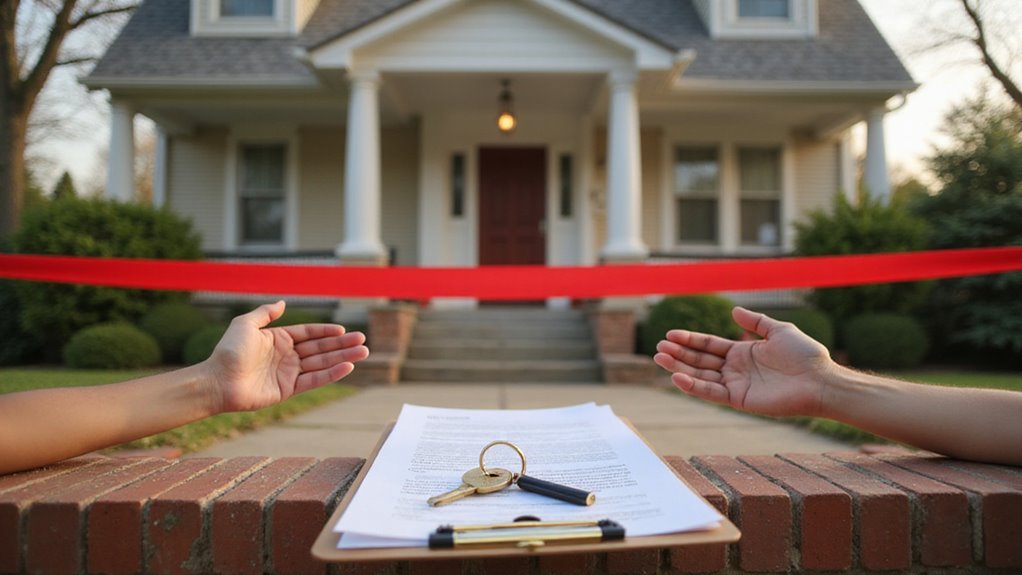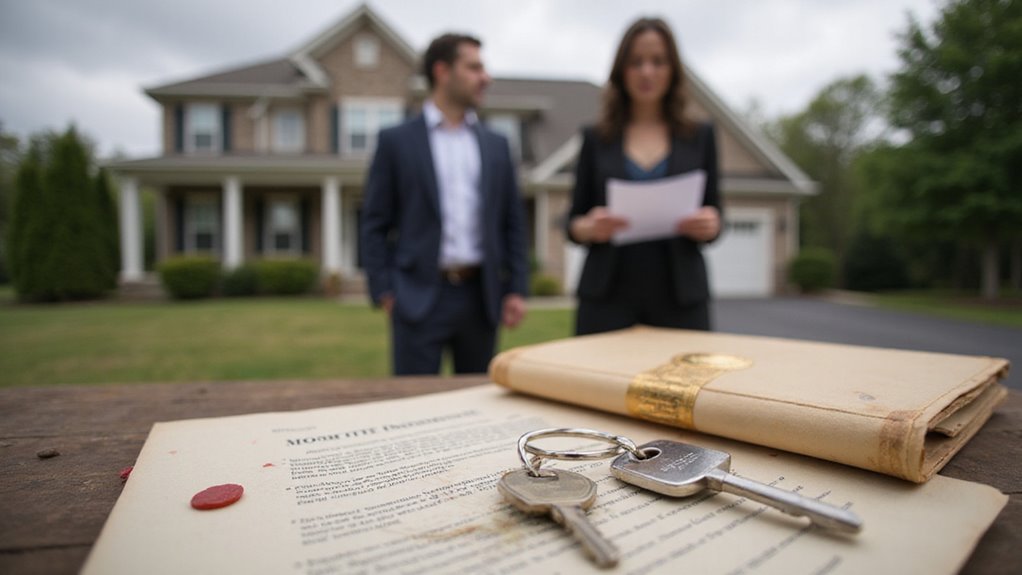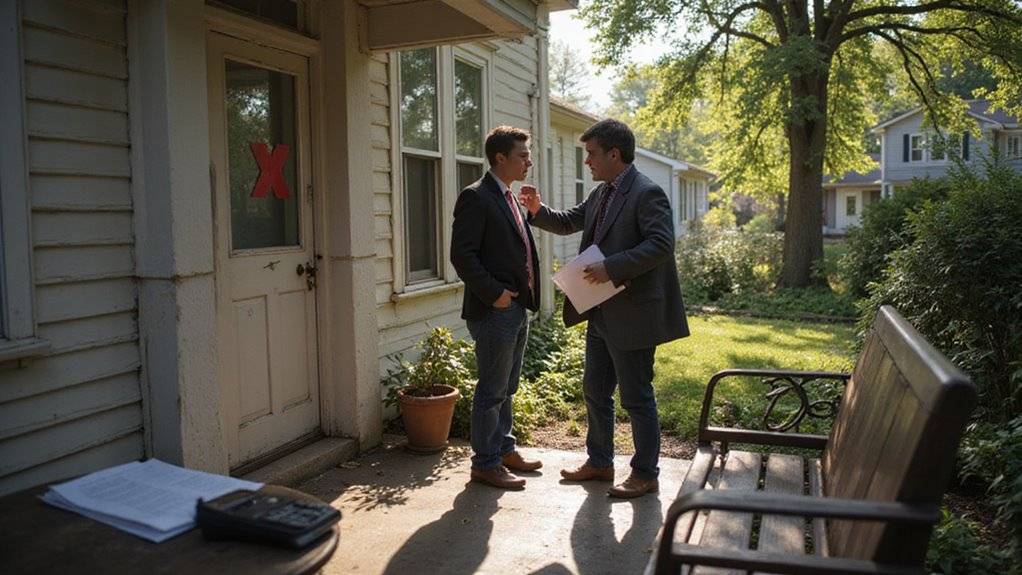Buying a home is exciting, but liens can create big problems. A lien is a legal claim on a property due to unpaid debts. Many buyers do not realize how much a lien can affect a home purchase.
This issue can delay closing or even end your deal. You might also inherit debt or legal troubles if you are not careful. It can feel overwhelming if you do not understand what liens mean for you.
To protect yourself, always check for liens before making an offer on any home. You should learn how liens work and how to handle them.
This simple step can save you time, money, and stress. This blog will explain how to spot liens and what you can do if a property has one.
Key Takeaways
- Unresolved liens on a property can delay closing, decrease value, and result in legal or financial complications for buyers.
- Conduct a thorough title search and review public records to uncover any existing liens before making an offer.
- Lien priority affects which debts must be paid first; some liens, like property tax liens, may take precedence over mortgages.
- Buyers may become legally responsible for outstanding liens if not resolved before purchase, risking unexpected debt after closing.
- Work with real estate professionals to negotiate lien payoffs, ensure lien releases, and secure a clear title before finalizing the sale.
Defining Liens and How They Attach to Properties

Liens are legal claims that creditors put on a property to make sure they get paid back. If you buy a home, you need to know how liens work. Liens are recorded in county records to tell everyone that someone else has a claim on the property. Buyers and sellers in St. Charles County especially benefit from working with local real estate market experts who understand how liens impact property transactions.
Lien priority decides which creditor gets paid first if the property is sold or foreclosed. The highest-priority liens must be paid before any others. This order matters if there are multiple claims.
If a lien is not paid, the creditor can take legal steps to collect the debt. This might include foreclosure or a court-ordered sale. Knowing about liens helps you avoid problems when buying a home. Sellers with liens on their home may sometimes choose to sell as-is to avoid paying for repairs or clearing debts before closing.
Common Types of Liens Found on Residential Real Estate
When you’re evaluating a property, it’s essential to recognize the most common liens that might affect its title. Property tax liens and mechanic’s liens often appear on residential real estate, each carrying serious legal and financial consequences.
Understanding how these liens arise and what they mean for homeowners will help you avoid costly surprises. Homebuyers should also be aware that capital gains tax exclusion may be impacted if a lien prevents them from meeting the IRS residency requirements when selling their primary residence. If you need to sell a house fast due to a lien or other issue, working with cash home buyers in Florissant can provide a quick and hassle-free solution.
Property Tax Liens
Property tax liens are common on residential homes. If a homeowner does not pay property taxes, the local government can place a lien on the property. This lien usually takes priority over other claims, including mortgages.
A property tax lien can cause title problems for buyers. If a lien remains unpaid, it can even lead to foreclosure. Buyers should always check the property’s tax status before moving forward.
If there is a property tax lien, it must be resolved before closing. Buyers should ensure the title is clear to avoid future issues. Satisfying any lien quickly helps protect your ownership rights.
Mechanic’s Liens Explained
A mechanic’s lien is added to a home’s title if the homeowner does not pay for work or materials. Contractors, subcontractors, or suppliers can file this lien to claim unpaid money. The lien makes it hard to sell or refinance the home.
Mechanic’s liens often have high priority over other debts. Sometimes, the lien may even come before the mortgage, depending on state laws. If this happens, you must resolve the lien first.
If you buy a home with a mechanic’s lien, the creditor can take legal action. The creditor may force the sale of the property to get paid. Always check for liens and resolve them before buying a home.
How Liens Affect the Home Buying Process

A lien can make buying a home more difficult. It creates legal and financial problems for buyers. If a property has a lien, buyers may face delays and extra steps.
A lien clouds the property’s title. Most lenders will not approve a mortgage unless the title is clear. If you want a loan, the lien must be resolved first. Some buyers opt for cash offers with no lender involved, which can help bypass traditional financing hurdles. A lien on a property’s title usually stops buyers from getting a mortgage until the issue is fully resolved.
The lien may also lower the home’s value. Buyers and appraisers often see homes with liens as less desirable. If market conditions are weak, a home with a lien might sell for less than similar homes without liens.
If you understand how liens affect home value and sales, you can make smarter choices when buying. Always check for liens before making an offer. If you find one, ask how it will be removed.
When selling a home with a lien, some buyers—such as local cash buyers—can still purchase your house as-is, often handling all the paperwork and closing costs to make the process smoother.
Spotting Red Flags in Property Listings
Look for warning signs when reading property listings. Phrases like “as-is sale” or “seller can’t make repairs” may mean legal or financial problems. These words can show that the property has liens or other issues.
A sudden price drop or a focus on a quick sale can also raise concerns. These signs may mean the seller needs money fast or wants to clear debts. If you notice these, ask the seller for more details. Some buyers, such as trusted cash home buyers, specialize in purchasing homes quickly even when there are liens or legal complications.
Always read the property condition disclosures carefully. If possible, get a full home inspection to find hidden problems. If the listing is in a declining neighborhood, this could signal more risks.
If you spot any of these red flags, ask direct questions before making an offer. Careful research helps protect your interests. If you are unsure, consider speaking with a real estate expert.
Some cash buyers will offer fair cash offers for homes with liens and even handle all closing costs to make the process easier for sellers.
The Importance of a Title Search

A title search checks if a property has legal issues. It finds out if there are any unpaid debts or claims. This step helps you avoid buying a property with hidden problems.
Official records can show if previous owners left any unresolved debts. If you skip a title search, you may inherit someone else’s troubles. The search protects you from unexpected costs. Working with buyers who offer no-obligation cash offers can also help you avoid delays or surprises, as they often handle these title checks as part of a straightforward process.
A clear title lets you buy with confidence. If issues are found, you can negotiate or walk away. This process helps you make smart decisions about your investment.
If the property is being purchased through a land contract, reviewing the contract terms is also essential to ensure there are no restrictions or unresolved balances that could affect your purchase.
What a Title Report Reveals About Liens
A title report shows all liens on a property. It lists each lien, such as a mortgage, tax lien, or mechanic’s lien. The report also shows which lien gets paid first if there is a foreclosure.
You will see any other claims, like easements or restrictions, that might affect your use of the property. If you read the report carefully, you can find risks or issues before you buy. This helps you avoid problems and make better decisions. Working with buyers who cover all closing costs can simplify the transaction when liens are involved, making the process less stressful for both parties.
If a lien has high priority, it will be paid before others in a sale or foreclosure. Buyers should always check the title report before making an offer. If you find unexpected liens, you may ask the seller to resolve them.
If you are selling a home with liens, working with a family-owned local business can make the process less stressful, as they have experience handling difficult situations and can offer clear, simple agreements.
Steps to Verify and Investigate Existing Liens

Title reports show recorded liens, but you must verify and investigate all property liens yourself. Some liens may be unrecorded or very recent. If you skip due diligence, you might face hidden debts later. When investigating liens, be aware that multiple owners or special circumstances—such as ownership disputes—can make the process more complex and may require additional steps.
You should contact local county offices to get the latest lien records. County records may include updates missed by the title report. If you find differences, ask for clarification.
A property valuation from a licensed appraiser can show how liens affect value. Appraisers often know how to spot these issues. You should review their findings before buying.
If you schedule a home inspection, you might find signs of unpaid work. This could point to unresolved contractor or mechanic’s liens. If issues appear, check for related liens.
Hiring a real estate attorney can help if liens are complex or unclear. Attorneys can explain your legal risks and options. If you are unsure, seek legal advice before proceeding.
If you’re dealing with liens and want a stress-free selling experience, companies like Freedom Path Investors can purchase homes as-is and handle all the paperwork, helping you avoid additional complications.
Negotiating With Sellers When Liens Are Present
When you encounter a property with liens, you need to evaluate how those debts can be resolved before closing. Insist the seller provides a clear plan for paying off the liens or negotiates a payoff as part of the sale. Use the presence of liens as influence to adjust the purchase price or request additional concessions that protect your interests. For added peace of mind, consider working with trusted local title companies to ensure all liens are properly addressed and the transaction remains smooth.
Assessing Lien Resolution Options
A property with liens needs careful review before buying or selling. Liens must be settled to ensure the title is clear at closing. If liens remain, they could cause delays or extra costs.
Buyers should ask the seller for all lien documents. These documents should show the type, amount, and order of each lien. If the seller cannot provide this, consider delaying the process.
Legal counsel can help review the title report. If there are questions about lien priority, a lawyer can explain the risks. If you are unsure, always consult a legal expert.
If liens exist, try to negotiate with the seller to pay or reduce them. Unresolved liens may affect your loan or insurance. If financing depends on a clear title, check with your lender first.
Careful review and open talks with all parties can prevent problems. If you follow these steps, you are more likely to protect your interests.
Requesting Seller Lien Payoff
If a property has a lien, you should ask the seller to pay it off before closing. This will help you avoid taking on someone else’s debt. Always request written proof that the lien will be paid.
A paid-off lien is important for a clean title transfer. If there is no payoff, you could face legal problems later. Condition your purchase on the seller removing all liens.
Compare sale prices in the area to see if the lien or any repairs have affected the property’s value. If the price seems low, check for issues that may have caused the lien. This will help you make a smart investment.
If you insist on a lien-free sale, you will protect your money and future plans. This makes your home purchase safe and stress-free. Always check for liens early and act quickly if you find one.
Leveraging Liens in Negotiations
A property lien can help you negotiate better terms with the seller. Sellers often want to remove liens quickly. If you approach negotiations carefully, you can gain an advantage.
You might ask for a lower price to offset the lien’s cost or risk. Buyers can also request the seller to cover closing costs. If the seller is motivated, they may agree to these terms.
Some buyers ask the seller to clear the lien before closing. This ensures you get a clean title. Liens can also give you leverage to request repairs or better inspection terms. If you use liens wisely, you can improve your deal. A clear and logical approach often leads to better results.
Lien Release: What It Means for Buyers
A lien release means the seller has paid off debts linked to the property. Buyers can feel confident they will not inherit these debts. This protects your legal ownership and reduces risks when buying a home.
The lien must be fully paid for a clear property title. If not, buyers might face unclear ownership issues. Official documents confirming the release give buyers legal protection.
Public records must show the lien is gone. If the records are not updated, buyers could face hidden financial problems later. A final verification step helps ensure a smooth closing, but missing a release can cause delays or cancel the deal.
The Role of Title Insurance in Protecting Buyers

Title insurance protects home buyers from hidden claims or debts. It helps ensure you will not lose your home due to past issues. This coverage gives peace of mind during your purchase.
A title insurance policy shields you from unknown liens by previous owners. It also protects your home’s value if legal disputes arise. If someone questions your ownership, the policy can help.
If you inherit a property, title insurance covers your interests. The policy may pay for legal costs if you must defend your ownership. Buyers who want security should consider this protection.
Financing Challenges When a Home Has a Lien
Financing a home with a lien is often difficult. Lenders see properties with liens as risky and may refuse your loan. If you want to buy, you must resolve the lien first.
Unresolved liens can lead to stricter loan requirements or delays. You may need to work with the seller to clear the lien. This can add extra time and costs to your purchase.
Government-backed loans usually will not finance homes with active liens. If you need these loans, you must wait until the lien is settled. Knowing these challenges helps you plan better and avoid surprises.
Legal Risks of Purchasing a Home With Unresolved Liens
Unresolved liens are legal claims that stay with a property. If you buy a home with these liens, you face serious legal risks. The liens do not go away when ownership changes.
You could become responsible for paying the liens, even if you did not know about them. Creditors may sue you to recover their money. If you cannot pay, you might lose the home through foreclosure.
Title insurance might not help if the liens were not disclosed. Selling the home later could be difficult or delayed. Always research the property’s history before you buy.
How to Remove or Settle Liens Before Closing
To protect your interests before closing, you’ll need to address any outstanding liens head-on. You can often negotiate payoff amounts with lienholders, potentially reducing your costs. By working with your escrow agent, you ensure all liens are settled and the title is cleared, paving the way for a powerful transfer.
Negotiating Lien Payoff Amounts
Negotiating a lien payoff amount means agreeing on how much you will pay to clear the lien. This step is important when buying or selling property with a lien. If you do not settle the lien, the sale may not go through.
You should first ask the lienholder for a written payoff statement. This document shows the exact amount you owe, including any fees. If you notice errors, you can ask for corrections.
Lien priority decides which debts must be paid first if there are several liens. You should check this to see which liens need attention before others. If you are unsure, consider seeking legal advice.
If you face financial hardship, you can explain your situation to the lienholder. Some lienholders may accept a lower payoff if foreclosure is not in their interest. Market conditions can also support your request for a reduced amount.
Always put any agreements in writing. This protects both sides and avoids future disputes. Keep copies of all documents related to the negotiation.
Clearing Title Through Escrow
Escrow helps clear the title before you buy a home. The escrow agent holds funds and documents until all conditions are met. If there are liens, the agent makes sure they are paid off or released.
A title search checks for any claims against the property. Escrow agents use the seller’s money to pay off these claims. This process guarantees you get ownership without old debts.
Home inspections and property appraisals should be done early. These steps can show problems that might affect the sale. If issues appear, you may need to renegotiate before closing.
Escrow professionals protect you from legal or financial surprises. If you rely on them, you are more likely to get a clear title. This makes your home purchase safer and smoother.
Working With Real Estate Professionals on Lien Issues
Working with real estate professionals helps you manage property liens during transactions. These experts have the skills to handle lien issues. They make sure your home purchase is safe and legal.
Real estate agents, attorneys, and title companies each play a key role. They explain the risks and check all documents for problems. If liens are found, they help negotiate solutions.
A good professional has experience with complicated deals, including those with liens. You should ask about their background before hiring them. This helps you choose the right support.
Experts can review the home inspection report for signs of lien-related repairs. They may also research the neighborhood for common lien problems. If needed, they talk with lien holders to settle any debts.
Title companies work to confirm the property has a clear title. They check for any liens before closing the deal. If issues come up, they guide you through the next steps.
Conclusion
If you are considering a home with liens, careful attention is essential. If buyers overlook liens, they may face costly legal problems. By resolving these issues before closing, buyers can ensure a smoother purchase.
If you want to avoid complicated processes, selling to a cash buyer is a smart choice. We buy houses for cash, even those with liens or other challenges. If sellers need a quick and hassle-free solution, we can help.
If you want peace of mind, work with a trusted company. At Freedom Path Investors, we make selling your home simple and stress-free. Contact us today to find out how we can help you move forward.







